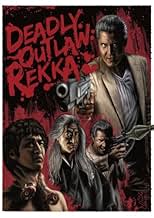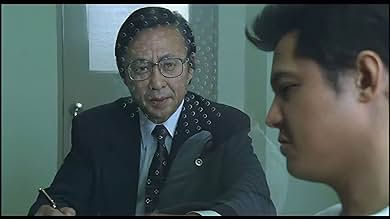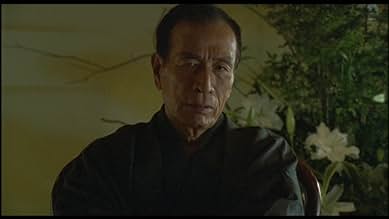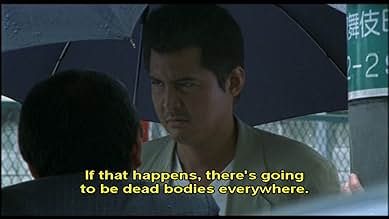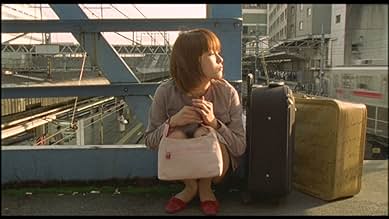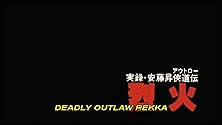Jitsuroku Andô Noboru kyôdô-den: Rekka
- 2002
- 1 h 36 min
AVALIAÇÃO DA IMDb
6,7/10
1,8 mil
SUA AVALIAÇÃO
Adicionar um enredo no seu idiomaWhen his beloved boss is killed, a dangerous young gangster cuts a path of vengeance through the Japanese mafia.When his beloved boss is killed, a dangerous young gangster cuts a path of vengeance through the Japanese mafia.When his beloved boss is killed, a dangerous young gangster cuts a path of vengeance through the Japanese mafia.
Avaliações em destaque
This was really one great ride from Takashi Miike, if you love or you are familliar with his style you will really enjoy Deadly Outlaw:Rekka, it is not intelligent movie, it is not movie with a big budget but it is entertraining and full of energy, and yes the cast in this one is amazing, so many great memorable faces from Japanese cinema, sadly a lot of them are now deceased: Joe Yamanaka, Rikiya Yasuoka, Yuya Uchida, Tetsuro Tanba, Shin'ichi Chiba and the main protagonist of the movie Riki Takeuchi, this is one of his most memorable roles for sure. The first half of the movie is like any other regular Yakuza movie, the second part is more unique cartoonish Miike style, and it works in the movie very well, love the ending when Riki is taking Bazooka to destroy his enemies. You will remember this movie thanks to magnificent cast and its charachters, i enjoyed this one more than more known Dead or Alive. In the same day i have watched Kikoku or Yakuza Demon from 2003, it is different sort of the movie, more regular Yakuza crime, but my recoomendation is to watch it in combination with Deadly Outlaw Rekka. I give this one 8/10.
10ele129
Like many people I was first turned onto the works of the great director Takashi Miike in the movie "Ichi the killer". After viewing that film I was instantly hooked to his take no prisoners style. Takashi Miike is a man that truly stretches the boundaries of violence and audacity into an art form. Several months later I was surprised to see "Deadly Outlaw Rekka" sitting on the shelves of my local Best Buy. Due to the rarity of Takashi Miike's films I bought it without hesitation, and I'm glad I did. Japanese film star Riki Takuechi (or as i like to call him, cool hair guy from "Dead or Alive") plays the roll of Kunisada, a grizzly yakuza hell bent on revenge for the death of his boss. As the story unfolds the audience becomes ensnared in webs of love, betrayal, sorrow, and revenge. Though lacking in the unbridled violence that originally drew me in to these kind of movies the gritty and often times zany style of Takashi Miike remains ever present. Overall "Deadly Outlaw Rekka" is a fantastic film that is a must have for fans of Takashi Miike or just really great action films and worthy addition to any movie collection!
Miike shows us in this film his outstanding gift for the yakuza genre from the first minute to the last. This time he adds a soundtrack from the Flower Traveling Band, Satori, a Doom Metal key album from 1971 that makes those master shoots, of perfect color, shine without stopping during the cinematographic experience he proposes.
His characters flow before the viewer like a handful of impossible to stop Japanese scarfaces. Shinjuku, mafia, escorts, magic and Rock and Roll !!
Rekka is a movie that deals with the theme of backstabbing and diplomacy of the new Yakuza clashing against the violence and honor of the old Yakuza; a common theme in Miike's under-the-radar gangster movies. It begins when the protagonist's father, the leader of a crime family, is killed. Before he knows what's happening, the new boss of his gang is already making agreements and accepting the murder to avoid a full-scale gang war. Needless to say, the son isn't happy, so he seeks revenge on the rival crime family. Knowing this, the new boss tries to get rid of him so that he can enjoy his new place in the Yakuza hierarchy.
On its own, this is an exciting modern Yakuza thriller filled with bloodshed and intrigue. But if you're already a Miike fan, you might be let down by a few details.
Rekka follows a pretty distinct formula. It has the same plot ideas, nearly the same characters, some of the same actors, and the same filmmakers as Agitator and Kikoku (which came out later). While Miike changes up the style and feel of each one, it still looks like he made three different versions of the same movie. Shigenori Takechi, the screenwriter of all three, has to be the laziest guy in the film industry. You see the same characters doing the same things, only with different names and settings. Like the other movies, the protagonist is a seemingly invincible and honorable guy who just can't seem to get killed no matter what he does. There is a charismatic and equally invincible hit-man chasing him. There are greedy and cowardly superiors that only he can stand up to. There is a dethroned and deceased father figure that he wants to avenge. And of course, there is a love interest that appears for a few minutes combined and has no personality or reason to even be in this movie.
The way that this movie is different is that the feel is a little more intense and modern than the other two. The visuals and camera-work are comparatively better and do a much better job of grabbing your attention. It is not as slow-paced and complicated as Agitator (clearly the best of the three), and it's all-around better than Kikoku (the worst). The ending is the most unique part. For better or worse, it is incredibly strange, and I know that some people will like it. Rekka appears to have the largest budget of the three movie and is the easiest to understand; it's definitely the one to show to your friends.
Like those two other movies, there are no insane shocker moments or incredible gore effects that will stick in your head forever. Rekka has almost nothing in common with Ichi or Fudoh, for example, so new fans of Miike's work might not get what they expect. But it has more than its share of violence, just not enough to make your head spin.
On it's own, Rekka is definitely not a waste of time, and my criticism doesn't sound fair at all. However, the feeling is ruined when you've seen Agitator and/or Kikoku. Seeing these movies after each other in a short span of time left me with a feeling that I got from Graveyard of Honor, another Miike/Takechi product. But in that case, it only took one movie to make me feel uncomfortable by giving me the same message over and over again.
On its own, this is an exciting modern Yakuza thriller filled with bloodshed and intrigue. But if you're already a Miike fan, you might be let down by a few details.
Rekka follows a pretty distinct formula. It has the same plot ideas, nearly the same characters, some of the same actors, and the same filmmakers as Agitator and Kikoku (which came out later). While Miike changes up the style and feel of each one, it still looks like he made three different versions of the same movie. Shigenori Takechi, the screenwriter of all three, has to be the laziest guy in the film industry. You see the same characters doing the same things, only with different names and settings. Like the other movies, the protagonist is a seemingly invincible and honorable guy who just can't seem to get killed no matter what he does. There is a charismatic and equally invincible hit-man chasing him. There are greedy and cowardly superiors that only he can stand up to. There is a dethroned and deceased father figure that he wants to avenge. And of course, there is a love interest that appears for a few minutes combined and has no personality or reason to even be in this movie.
The way that this movie is different is that the feel is a little more intense and modern than the other two. The visuals and camera-work are comparatively better and do a much better job of grabbing your attention. It is not as slow-paced and complicated as Agitator (clearly the best of the three), and it's all-around better than Kikoku (the worst). The ending is the most unique part. For better or worse, it is incredibly strange, and I know that some people will like it. Rekka appears to have the largest budget of the three movie and is the easiest to understand; it's definitely the one to show to your friends.
Like those two other movies, there are no insane shocker moments or incredible gore effects that will stick in your head forever. Rekka has almost nothing in common with Ichi or Fudoh, for example, so new fans of Miike's work might not get what they expect. But it has more than its share of violence, just not enough to make your head spin.
On it's own, Rekka is definitely not a waste of time, and my criticism doesn't sound fair at all. However, the feeling is ruined when you've seen Agitator and/or Kikoku. Seeing these movies after each other in a short span of time left me with a feeling that I got from Graveyard of Honor, another Miike/Takechi product. But in that case, it only took one movie to make me feel uncomfortable by giving me the same message over and over again.
Seemingly modeled after DEAD OR ALIVE, starting off with a stylistical hodge podge of slow-mo gunfights and paranoid posturing and sizzling in the finale with a fair share of comic-book outrageousness, Rekka succeeds as a movie not for being ultraviolent or particularly graphic (it is neither by Miike standards - although still violent enough to raise a public outcry if it was the work of a mainstream American director), not because yakuza underlings get shot full of holes or Riki Takeuchi scowls like a bulldog as he shoots rocket launchers in the middle of crowded streets (DOA homage anyone?), not for the sound and fury, but for the moments in between. In that respect, Rekka is antithetical to DOA. Whereas DOA dragged through a drab and lifeless middle act to arrive at an exciting conclusion, Rekka sustains itself through moments of quietude and intimacy. In between the outbursts of violence, Miike gives us life as lived. Takeuchi's friend giving him advice on his hair dye. The glances between Takeuchi and his Korean girlfriend. The dingy eateries, night clubs and neon-lit streets - Miike prowling Fukasaku's stampin' grounds half a century after the patriarch of the yakuza film first pictured a different kind of postwar Japan.
In the end, Rekka works so well as a movie because Miike restrains the child within him eager to shock and impress and embraces the dramatist who observes the small moments of life. The plot is mostly forgettable, something about the son of a yakuza boss going on a spree to avenge the death of his father while a gangland conspiracy festers behind and a war between the different fractions is about to break out, and Takeuchi in the leading role scowls a little too much for my liking. But overall, this is as good a yakuza flick as I've seen from Miike, violent, funny, occasionally beautiful, imaginatively conceived but hastily executed (as with most Miike films), a thoroughbred Miike flick bearing all his trademarks, one aimed at both the heart and the gut. Not a masterpiece of any kind but a worthwhile movie.
In the end, Rekka works so well as a movie because Miike restrains the child within him eager to shock and impress and embraces the dramatist who observes the small moments of life. The plot is mostly forgettable, something about the son of a yakuza boss going on a spree to avenge the death of his father while a gangland conspiracy festers behind and a war between the different fractions is about to break out, and Takeuchi in the leading role scowls a little too much for my liking. But overall, this is as good a yakuza flick as I've seen from Miike, violent, funny, occasionally beautiful, imaginatively conceived but hastily executed (as with most Miike films), a thoroughbred Miike flick bearing all his trademarks, one aimed at both the heart and the gut. Not a masterpiece of any kind but a worthwhile movie.
Você sabia?
- CuriosidadesTakashi Miike cut this movie to the strains of the 1971 progressive rock album "Satori" by the Flower Traveling Band, which he learned of through costars Joe Yamanaka and Yûya Uchida, who were also the band's founding members. Miike found the album to be way ahead of its time and was delighted at how well and inconspicuously it cut into a movie made 30 years later.
- Erros de gravaçãoAt 35:52 the shadow of someone holding a hand-held camera can be seen.
- ConexõesReferenced in Rebobine Isso! (2013)
Principais escolhas
Faça login para avaliar e ver a lista de recomendações personalizadas
Detalhes
- Data de lançamento
- País de origem
- Central de atendimento oficial
- Idioma
- Também conhecido como
- Deadly Outlaw: Rekka
- Empresa de produção
- Consulte mais créditos da empresa na IMDbPro
- Tempo de duração
- 1 h 36 min(96 min)
- Cor
Contribua para esta página
Sugerir uma alteração ou adicionar conteúdo ausente

